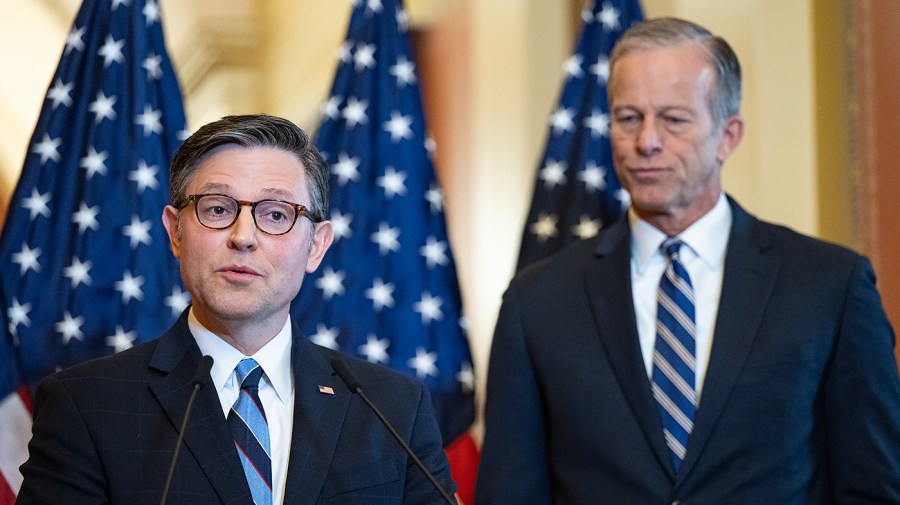
Frustrations are bubbling up among House Republicans after the conference — by the skin of its teeth — overcame internal disputes to adopt a framework for President Trump’s legislative agenda, a troubling sign for the group as it heads into the next, more difficult, step in achieving the president’s domestic policy priorities.
The rocky week leading up to the budget resolution’s adoption — with fiscal hawks withholding support as they pushed for commitments on spending cuts, forcing leaders to postpone a scheduled vote on the budget blueprint until the hard-liners acquiesced — left a bad taste in the mouth of Republicans in the other parts of the conference who worry that the high target for cuts could lead to slashes to Medicaid.
One moderate House Republican, granted anonymity to speak candidly, said members are “annoyed with the attention this small group gets.”
“These guys get all the attention, meanwhile the people who actually have vulnerable situations in terms of races, you know, we take tough votes,” the lawmaker added.
Beyond the gripes about tactics, the clearly mismatched expectations about the level of cuts in the final package are setting the stage for more clashes. The Freedom Caucus says it got commitments from leadership for $1.5 trillion in cuts, but moderates are banking on those assurances being non-binding, fearing that the target could lead to intolerable slashes to Medicaid or other social safety net programs.
Leaders will have to bridge that gap in the next step of the process, hashing out the exact details for Trump’s tax cut, energy policy, and border funding priorities over the coming weeks.
They’ll also have to decide how to handle the hard-liners if they deploy more strong-arm tactics.
A second House Republican, who requested anonymity to discuss the sensitive deliberations, expressed frustration with how leadership handled the situation this time around.
“Members like me expect these tactics from [the House Freedom Caucus]. The anxiety, however, comes from leadership capitulating to it,” the GOP lawmaker said. “It’s appeasement — not peace through strength!”
That dissatisfaction rose to the surface this week when Rep. Derrick Van Orden (R-Wis.) briefly voted “no” on the budget resolution before switching to “yes” — a move that he described as a symbolic “shot over the bow” at the House Freedom Caucus. He vowed to “personally sabotage every single thing the Freedom Caucus does until they get their mind right.”
“When they’re doing the reindeer games, they’re disenfranchising my voters, and I will not tolerate that any longer,” Van Orden said. “I don’t care if I get reelected if we can’t be effective.”
Asked if any of his frustration is directed at Speaker Mike Johnson (R-La.) for heeding their demands, Van Orden said: “That’s none of your business.”
In another sign of the tension, moderate Republicans huddled with Johnson during the final vote on the budget resolution Thursday to talk though concerns about what was being promised to the Freedom Caucus. After some of those centrists withheld their vote, they green-lit the budget blueprint with the understanding that the level of cuts — and what they apply to — would be still negotiable.
“The important thing is that the Speaker said we’re going to try our best to get to $1.5 trillion in savings, but he didn’t put anything in this resolution that would bind us to do that,” said Rep. Nicole Malliotakis (R-N.Y.), one of the members in that huddle. “And that’s the important thing, and that’s what we were against.”
The budget resolution directs the Senate to find a minimum of just $4 billion in cuts, a figure that is piddly in comparison to the instructions for the House to find at least $1.5 trillion in cuts. The detail that has drawn the most controversy is that the House Energy and Commerce Committee, which has jurisdiction over Medicaid, is ordered to find at least $880 billion in cuts — a figure even the Congressional Budget Office said cannot be reached without slashes to the widely-used social safety net program.
That gigantic gap was the source of outrage from fiscal hawks who feared getting steamrolled into accepting a final package with only modest cuts. But for moderates, the lower Senate number gave them a sense of security.
Rep. Mike Lawler (R-N.Y.), after the House approved the budget resolution on Thursday, downplayed the $1.5 trillion figure championed by the Freedom Caucus.
“The Senate is the number that will guide, right?” Lawler said. “At the end of the day, we will negotiate. We’ll find as much savings as we can across the entirety of the federal government. We will get a tax bill that cuts taxes, as opposed to allowing this to expire and seeing the largest tax increase in American history.”
House GOP holdouts on the budget resolution had been seeking changes to the measure that would make the $1.5 trillion minimum for the cuts binding. One idea brought up to the White House and in a late-night meeting was doing so through an amendment, which would have required the legislation to go back to the Senate for approval.
But in the end, the hard-liners settled on written commitments from the Speaker and a joint press conference with Johnson and Senate Majority Leader John Thune (R-S.D.) — in which Thune said it was the Senate’s “ambition” to hit the House number but didn’t offer any guarantees.
Rep. Thomas Massie (R-Ky.), one of two Republicans to vote against the Senate-crafted resolution, said his fellow fiscal hawks set themselves up for “the biggest deficit increase in the history of Congress” by trusting those non-binding commitments.
“The only piece of paper that matters is the piece of paper we voted on,” Massie said. “And if it ain’t in what we voted on, it ain’t going to happen.”
Mike Lillis contributed.

